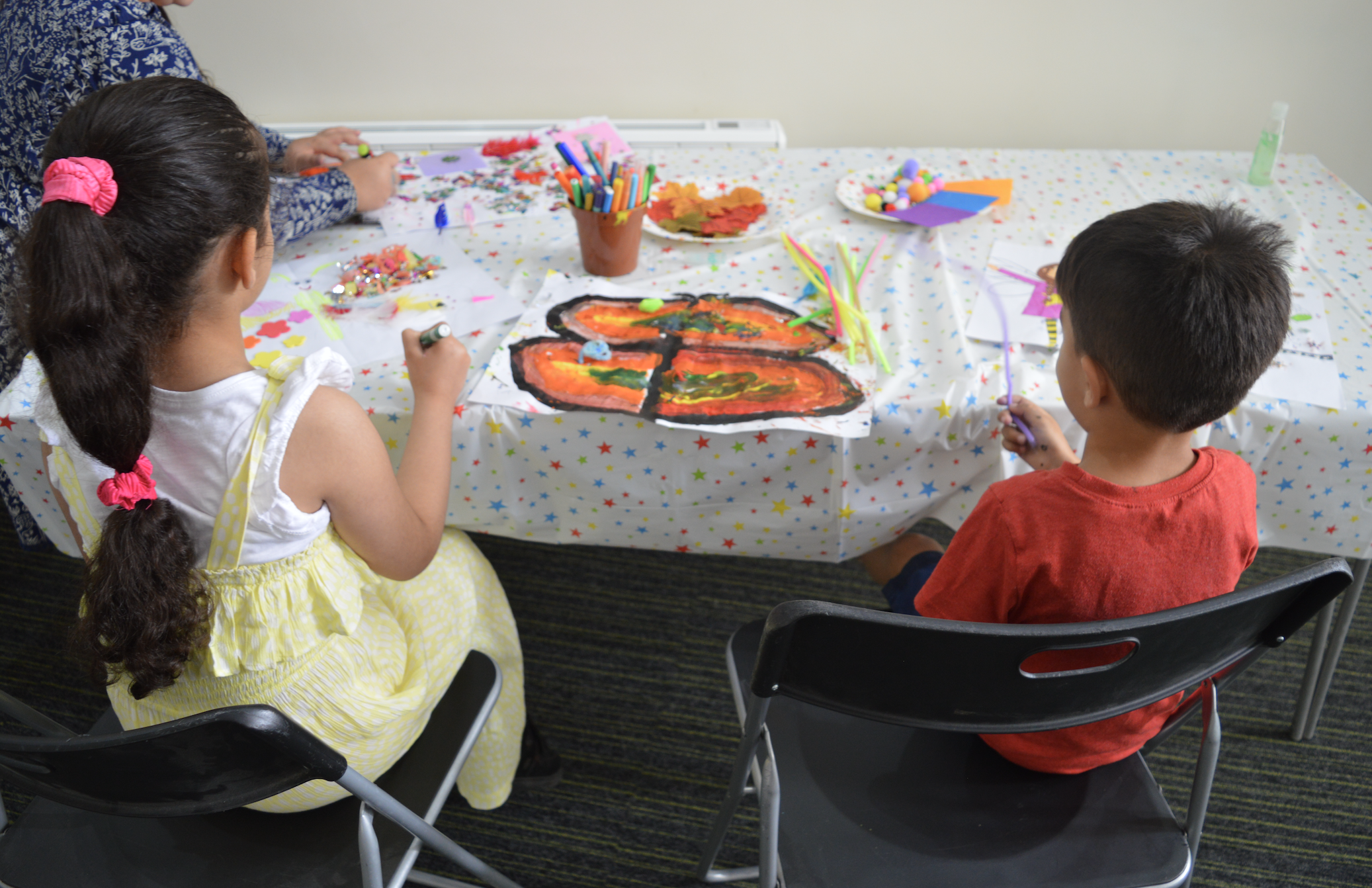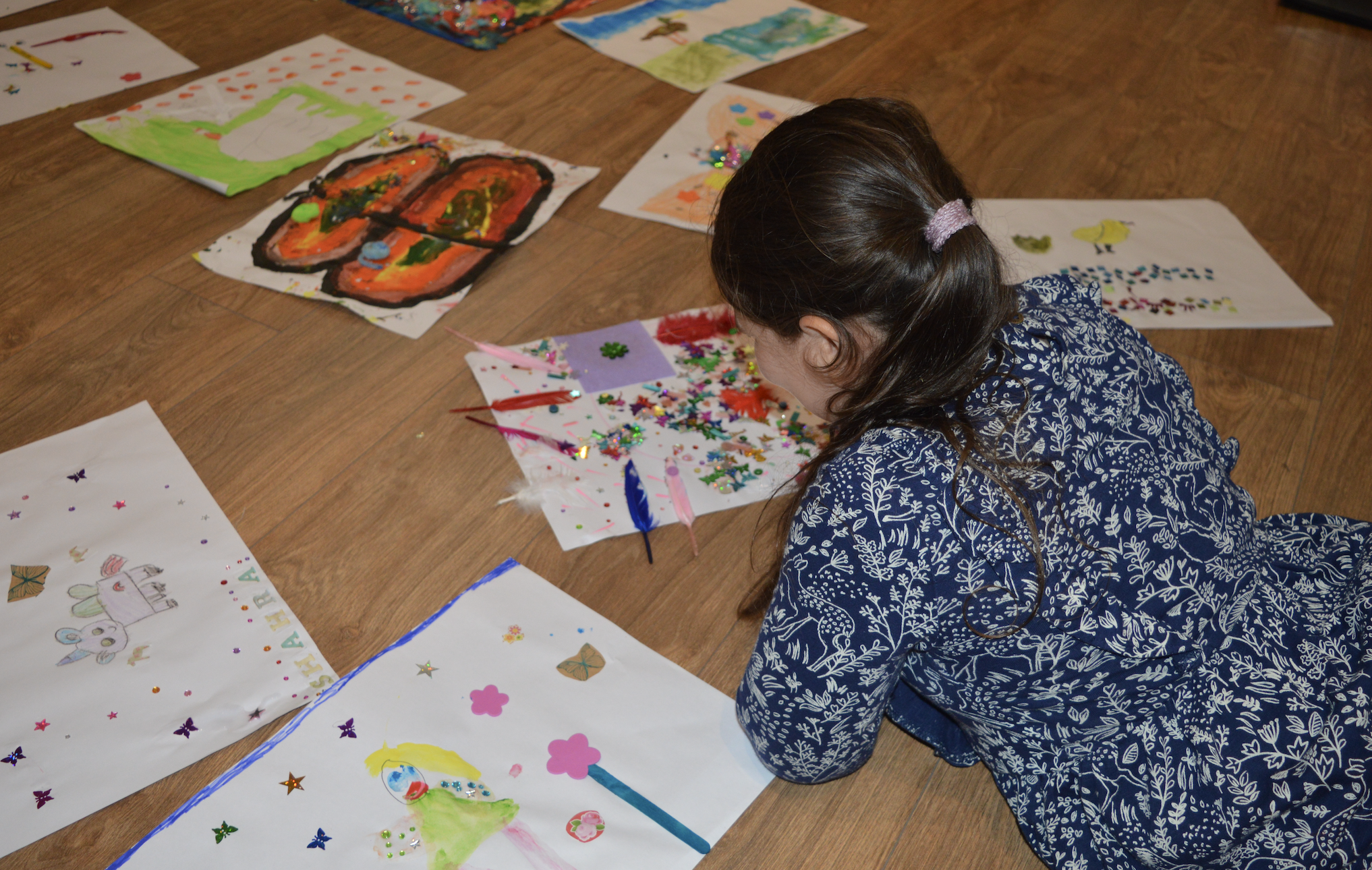Through its Foundation Fund, St John’s is financially supporting a brand-new initiative to support improving the speech and language outcomes for under 5s.
Launching this September, the Language for Life project will be delivered in partnership by Virgin Care and Bath and North East Somerset Council’s Early Years team. The project will focus on supporting pre-school children to reach age-related expectations in communication and language development before they transition into Primary School settings in Bath and Keynsham.
Language for Life will offer a refreshed, area-specific early years approach to speech and language development. With the support of a newly appointed Lead Speech and Language Therapist, Early Years practitioners will be offered the opportunity to adopt the Wellcomm communications and language toolkit; an evidence-based assessment and intervention programme designed for use by early years practitioners with no additional specialist skills needed.
David Hobdey, Chief Executive of St John’s Foundation said “The charity is excited to be a part of the Language of Life project, which was formally launched at an online event on the 6th July; it forms part of a suite of new programmes St John’s is supporting to address educational inequality in Bath and North East Somerset to ensure all children access the right start in life. Speech and language development in young children is critical and is fundamental in providing children with the communication skills they require to manage their emotions, behaviours and supports them to learn. Children from less advantaged backgrounds will typically have weaker speech and language skills than other more advantaged children, even at the age of two. The Language for Life project is aimed at children from 18 months of age; it is vital to address this gap at an early age since it widens and becomes increasingly harder to close as children age.”
Councillor Dine Romero, cabinet member for Children and Young People, Communities and Culture at Bath and North East Somerset Council, said: “This exciting project aims to equip early years practitioners with the specialist support and resources to really focus on closing the word gap that impacts on children’s later outcomes. We believe that all children deserve the best start in life and that’s what Language for Life is all about.”
Claire Galloway from Virgin Care who will be delivering the contract added “Following the successful launch event of Language for Life we are excited to continue to the next phase of the project working collaboratively with early years settings, families and the wider early years workforce. This is an amazing opportunity for us to work with our colleagues from partner agencies to make a real difference to the outcomes of children with speech, language and communication needs and their families”.
The Language for Life project is closely linked to the Foundation Fund’s Primary Empowerment Programme, which aims to support the development of primary school-aged children, providing additional support for reading, writing, oracy and mathematics as well as support with emotional and behavioural needs.
Local leaders have welcomed the publication of a report which sets out a new long-term vision for the area it calls Bath with North East Somerset.
The report is the result of a wide-ranging engagement exercise which involved more than a hundred local stakeholders in shaping the renewal and recovery of the local economy and communities in response to the Covid 19 crisis.
One Shared Vision sets out a new framework for fairer, greener, more creative and more connected communities. It proposes a new vision for a stronger, low carbon, more inclusive and diverse local economy as we recover from the impacts of the pandemic.
The report highlights that Bath, Radstock, Midsomer Norton, Keynsham, Paulton, Peasedown, Chew Magna and many other villages and rural areas form a partnership of communities which it terms Bath with North East Somerset
It also suggests new thinking and new ways of working to help the area thrive, prosper and tackle inequalities- all within the limits of the planet and the region’s natural resources.
Councillor Richard Samuel, Deputy Leader of Bath & North East Somerset Council and Chair of the Economic Recovery and Renewal Board, which led the development of the report, said: “One Shared Vision is the result of work which was started by the Board last summer in anticipation of the need to plan for post-pandemic recovery and renewal. Now that lockdown is easing- albeit with much uncertainty ahead- this forward-thinking is now bearing fruit.
“The pandemic highlighted a number of weaknesses in our local economy and One Shared Vision sets out a new direction. We saw during lockdown the high dependency of our economy on visitors and tourism. As we renew and recover, we will also need to make sure our visitor economy feeds through into a higher-wage economy and also helps us meet our climate and ecological emergency goals – for example, by encouraging longer stays. We have learnt much over the past year and as we emerge from Covid we have the opportunity to build resilience.”
City Global Futures, working on behalf of local leaders, carried out surveys, one-to-one zoom interviews and a series of workshops with residents and stakeholders from a wide range of sectors. Their views, ideas and ambitions shaped the new vision.
Alongside this work, the council ran an online “community dialogue” on the emerging themes of the vision from the stakeholder interviews and workshops, allowing over 70 residents to comment and contribute their own ideas, which were taken into account in the development of One Shared Vision.
Councillor Sarah Warren, Deputy Leader of the council and cabinet member for Climate and Sustainable Travel, said: “We have what is perhaps a once in a lifetime chance to build back greener and better, which will be crucial in helping us tackle the climate and ecological emergency. I’d like to thank everyone who has taken part in the work so far. This is the beginning of a wider process that will for the first time bring together all partners in our area around a shared vision for our future. The overriding message has been that as well as setting out a long-term direction for renewal, we should ensure that our vision delivers real action.”
Local leaders have pledged to work collaboratively to deliver One Shared Vision.
Ian Bell, Executive Director, Bath Chamber of Commerce and the Initiative in B&NES said: “Partnership working will be the key to our future economic success. The business community stands ready to do its bit to achieve sustainable prosperity which will benefit the whole community.”
Professor Ian White, Vice Chancellor of University of Bath, said: “We welcome the commitment to partnership which underpins the One Shared Vision. A sustainable greener future requires the type of innovation at which Universities like ours excel. The vision aligns closely with the work we are doing to develop a new Digital Strategy for the city and collaborative projects under the ‘Our Shared Future’ initiative in the areas of transport such as Bath Beyond the Car and De-Carbonising Building Stock. Working together on these and other initiatives is an essential foundation and framework for renewal.”
The commitment in the vision to addressing inequalities has received a positive response from a wide range of local organisations.
David Hobdey, Chief Executive Officer, St John’s Foundation, said: “Stark inequalities have long remained a feature of the Bath and North East Somerset area and I believe the vision set out will enable us to begin addressing some major societal challenges in the region. This is essential to create stronger communities and greater economic prosperity. The vision paves the way for genuine collaboration and more effective partnership working between different organisations and business across the region and our success in this respect will be critical to fulfilment of its ambitions.”
William Heath, Co-Chair, Fairfield House Bath, added: “The crisis calls for new thinking and new conversations. That means the discomfort of engaging and co-operating with those who are often not heard. This is a good start; we need a lot more of this.”
Laurel Penrose Principal and Chief Executive Officer, Bath College, added: “One Shared Vision identifies the key components of our strong heritage, lessons learnt from the pandemic and opportunities for the future. From Bath College’s perspective the ability to support a more equitable, inclusive, economically viable and greener future reflects well and mirrors its own strategic plan. These themes are central to the wellbeing and future prosperity of our communities as we emerge into a post Covid environment.”
Economic Recovery and Renewal Board members will be working together over the coming months to further progress One Shared Vision, including wider engagement with local communities, particularly with the voluntary and community sector and with young people.
Young refugee children who have settled in Bath & North East Somerset had a prominent spot to highlight their artistic talent when a mini art show went on display in Old Bond Street on Monday the 14th June.
The initiative was to help celebrate National Refugee Week. The pieces produced by the children took pride of place in the main window of the former Gap shop, owned by St John’s Foundation, on Old Bond Street, over the course of that week.
Using Home Office funding, B&NES Council commission Julian House to resettle people with refugee status through the Vulnerable Persons Resettlement Scheme (VPRS). The scheme exists to enable the resettlement of those who have been identified by the United Nations as being the most vulnerable people fleeing persecution, violence, and life-threatening challenges in their countries of origin. The charity works mostly with families, many of whom have significant medical conditions and/or who have survived torture. The project supports and empowers families to rebuild their lives, move on from trauma, and live happily and independently in the UK. Julian House works closely in partnership with local charity Bath Welcomes Refugees amongst other local, regional and national organisations.
Sally Harris is the Team Leader for the Julian House Resettlement Service “We have been doing this work now for 4 years and in that time we have supported some very vulnerable individuals. Despite the massive emotional challenges of leaving behind friends and family it has been humbling to see how well they have adapted and assimilated into local communities – taking on volunteering opportunities and paid employment. People often say that children are more adaptable than parents but it’s still not been easy for them. Again it’s been inspirational to see how well they have done – making new friends, learning a new language and culture.
We are indebted to St John’s Foundation for giving us such a great site to show off their artwork. They enjoyed doing it and it will be such a thrill for them to see it on show to a big public audience.”
Refugee Week (14-20 June) is a platform for people who have sought safety in the UK to share their experiences, perspectives and creative work on their own terms. Through a programme of arts, cultural, sports and educational events alongside media and creative campaigns. It enables people from different backgrounds to connect beyond labels, as well as encouraging understanding of why people are displaced, and the challenges they face when seeking safety.


The TRC was founded in 2011 by Betsy de Thierry after she had a vision of seeing children find lasting recovery. Taking her 20 years of experience as a teacher, a psychotherapist, an author and a mother of 4, Betsy set about creating the charity and finding a way to help families recover from significant trauma and crisis.
Since that day, the TRC have worked with over 1,000 clients and delivered over 20,000 hours of face to face recovery intervention. Over the last 10 years, the TRC has worked with many families in the South West and have opened more centres in Oxford and Guernsey.
Working with a highly trained team of complex trauma professionals, psychotherapy is provided at the TRC via play, music, art and creative therapy sessions for the child or young person, with therapeutic sessions provided for the parent/carer happening at the same time. The TRC also provide specialist help for other professionals working with the child, such as help with an EHCP plan in educational settings. Working holistically in this way, gives the family a chance to recover from the trauma as a unit and brings hope in what can be a really difficult time.
Betsy de Thierry says “It has been an incredible 10 years of helping families find restoration from the traumatic experiences they have survived. As a core team we have been surprised that what started as a small local therapy centre has grown into a nationally recognised centre of excellence for complex trauma. When I founded the charity I was not aware that the important topic of recovery from trauma is not often understood because it is not often taught in qualifying courses around the world. We have been honoured to consult and help families and professionals from all over the UK whilst remaining as a local specialist resource for families in Bath.”
The effectiveness of their work has been evaluated by Christ Church Canterbury University Salomon Applied Psychology Department using our clinical data from 248 clients in 2019 and it was found that 98.8% of the sample had significantly clinically improved through the TRC’s intervention, with difficulties significantly decreasing, and strengths significantly improving.
More than that though, are the many hundreds of positive stories from families and children of lives completely transformed due to the specialist care and love from the TRC team over many months and often from families who have not found help or hope from anywhere else.
A former TRC client says “The support we have received as a family has changed our lives. Before we were at the TRC we felt shamed, alone and hopeless. You have supported us through our worst times and you have helped the children’s schools to understand too. You have never judged us but have shown patience and kindness as we all changed and recovered.”
If you would like to help the work of the Trauma Recovery Centre continue to bring hope to children, young people and families then you can donate via their website.
For more information about the Trauma Recovery Centre visit www.trc-uk.org
St John’s joins forces with national not-for-profit organisation, ImpactEd to evaluate its work supporting disadvantaged children in BaNES.
Determined to build a community where children are supported to grow up healthy, happy and educated, last February St John’s launched The Foundation Fund. This substantive 10-year fund, allocated finances and resources to be spent primarily on nutritious food projects; safe spaces; behavioural and emotional support and help with literacy and numeracy.
Evaluating the impact of The Foundation Fund is crucial to making sure that St John’s is using its resources in the best possible way and ensuring lasting change is being made in children’s lives.
Not-for-profit, ImpactEd, helps schools, charities and funders to properly evaluate impact and to see what is working best to improve outcomes for young people so partnering with them made perfect sense to St John’s. “After a thorough recruitment search, we are delighted that ImpactEd are to be our new evaluation partner. Our aim, when launching The Foundation Fund last year was to level the playing field when it comes to life chances and expectations of our children” said Sam Gillett, Head of Delivery and Impact at St John’s. “It’s crucial that we understand the impact of any projects we may support, so we can best direct our funds and resources to the most successful initiatives” he added.
Kristy Evers, Head of Impact Partnerships at ImpactEd was equally enthusiastic about the partnership. “We believe this is a great opportunity to help improve young people’s outcomes and life chances, which is at the core of our mission as an organisation. Evaluating and understanding the impact of interventions is crucial in supporting children as it helps us to understand what works and what doesn’t and so we can make more informed decisions as a result”
Among other things, the new partnership will be analysing direct and indirect consequences of the Fund, looking at whether the original objectives have been realised, as well as assessing what costs the results have been achieved at – as in are there wiser ways to allocate the money. Results of the St John’s/ImpactEd evaluation will be shared with stakeholders on a regular basis throughout the longevity of the Fund, making the work transparent and available to all.
Over the coming months, St John’s will be looking to engage with organisations able to support the Fund’s aims. The team has been working with local primary schools to develop The Primary Empowerment Programme, due to start in the new academic year; organisations that come on board will be awarded funding to deliver support to their chosen schools. This provision will cover emotional and behavioural support, as well as additional support with numeracy and literacy.
This Sunday marks the International Day of Education, which unlike ever before, is taking place during a global pandemic. With the majority of UK children currently being home-schooled, it seems more prescient than ever to celebrate the day and all it stands for.
We know that education is key to sustainable development – as defined by the Bruntland Commission Report as “development that meets the needs of the present without compromising the ability of future generations to meet their own needs.” Furthermore, it is crucial to providing children the opportunity to escape poverty and complex social issues. The closure of schools in 2020/21 is bound to have long-term effects on children. Many are already thought to be up to six months behind where they should be in their educational development. The gap in attainment between private and state schools continues to widen, as does the gap between disadvantaged children and their more affluent peers generally.
So what does this look like in real terms: In some deprived households, there will be multiple children trying to share one electronic device; in others there will be no devices available and, undoubtedly, no, or limited, internet access. But inequality in technology provision is just the tip of the iceberg. Single parent families, for example, are more likely to have limited time, support and finances. Additionally, there will be some families that are caring, and homeschooling, children with disabilities full-time. There are many families who are suffering and all deserve support.
Before we look at what is happening at a national level, we first need to get our own house in order and tackle the problems on our doorstep. Considering its affluent veneer, few are aware that Bath and North East Somerset currently sits second from last in the UK in the Education Attainment Gap listings. Many children and young people living in areas of our county are among the most deprived in the UK, perform significantly worse at all levels of the education system than those from our better off communities.
Determined to make a difference and to shake up the status quo, in February 2020 St John’s launched its Foundation Fund with the vision to build a community where every child from birth to 12 years old is supported to grow into a healthy, happy and educated member of our community.
Little could we have known about what was about to be unleashed on the world.
The Fund is structured around four key areas of focus; nutritious food daily; safe spaces to go outside of school; support for behavioural and emotional needs; extra educational support.
The extra educational support will be implemented in part via our Primary Empowerment Programme, which aims to drastically reduce the Key Stage 2 gap within the next nine years using our targeted funding. This gap in educational performance between disadvantaged pupils compared to their better-off peers, is the single most striking measure of inequality, placing BaNES in the bottom decile in the UK. This funding will provide financial support for foundational reading, writing, oracy and mathematics as well as speech and language to seven schools with a disproportionate number of disadvantaged pupils.
In December, we awarded our schools £7,000 each to be used for digital equipment to support learning. The schools we are initially working with are St Mary’s Church of England Primary School; Castle Primary School; Twerton Infant School; St Martin’s Garden Primary School; Roundhill Primary; St Michaels Junior Church School and St Kenya Primary School. How crucial the timing and importance of this funding was, was lost on no-one, given the knock-on effects of the pandemic and the sea-change nationally to remote, device-led learning.
In the next few months we will be looking to engage with partners that can support our Primary Empowerment Programme. These organisations will be awarded funding they can use to deliver support to the chosen schools in the new academic year. This provision will cover emotional and behavioural support, as well as additional support with numeracy, literacy, speech and language.
Although we still have a long way to go, we are working closely with the schools to better understand their needs, the current education challenges and how our support can best be provided. Partnership working has proved the most effective way to support those in-need and ensure resources are reaching the places where they will have the biggest impact for children.

David became Chief Executive in July 2018 and he leads St John’s by following the same open, collegiate and non-hierarchical based principles he has applied throughout his career. He leads by example, encouraging self-confidence in his colleagues to make the most of their strengths and to uphold the attributes embodied in St John’s values of trust, kindness and courage. David believes passionately in the importance of St John’s role in removing inequality of opportunity in its communities and in fulfilling its purpose to change lives, for good. Read David’s full bio.
A round-up of an extraordinary year
And what a year it’s been. Had someone read my palm back in January and told me how the year would unfold, I am sure I would have asked for my money back! Even more surprising is how everyone, all over the world, seems to have taken the restrictions in their stride and suddenly we find ourselves in December and almost at the close of the year. For once, the rather banal saying ‘where has the time gone? ‘ seems apt.
With more people than ever before relying on food banks and donations, this year has shone a spotlight on the crucial issue of food poverty affecting the UK. The impact of the pandemic has been vast and has forced many individuals into a position where they now have to seek help to feed themselves and their families. For many, 2020 has been full of difficulty and unimaginable challenges.
This ignited a fire in the belly of the #ENDFOODPOVERTY campaign which, famously, had the support of footballer and activist, Marcus Rashford, as well as large scale charities and organisations. This saw the issue discussed at national level, with realities of food poverty shared widely.
Closer to home, the Bath community was determined not to let local children go hungry over half term and so the BaNES Holiday Hunger Appeal was established; the public raised a staggering £55,000 in donations– undoubtedly, the most rapid public response to a local food crisis and a testament to the residents of Bath and North East Somerset.
Food Poverty is a crisis that must be addressed both locally and nationally and we need to do all we can do support families in Bath and the surrounding area during these unprecedented times. When St John’s was asked to be part of the BaNEs Appeal, we were delighted to be able to help.
We joined forces with BaNES 3SG and Welfare Support to distribute the money raised to community-led food projects which are making a real long-term impact on food poverty. The organisations awarded the money were FareShare South West, Mercy In Action – Action Pantry, Oasis Hub, Weston Welcome Cafe and Food Club, Southside Family Project and Family Action.
As food poverty became a prominent feature in the national news, it was also centre stage at St John’s. At the beginning of this year, we launched our Foundation Fund. Our overarching aim for this fund is to build a community where children are supported to grow up healthy, happy and educated. Presciently, one of the four key workstreams of the Fund is to provide children with nutritious food. To do this successfully, first we need to support the infrastructure of our partner charities that are delivering food on the front line. The money raised through the Appeal was essential in making this happen.
The #ENDFOODPOVERTY campaign and the BaNES Holiday Hunger Appeal have demonstrated that our ambitions are strengthened when we work alongside one another. And continuing in the spirit of partnership-working, we are also part of the Food Poverty Steering Group; this is a network led by BaNES Public Health team, where local food providers and key stakeholders come together to tackle food poverty. It appears that some ‘good’ has come about as a result of the pandemic with organisations seamlessly coming together to help create a lasting impact for our community.
With Christmas only days away, it’s crucial we continue to look after the vulnerable members of our society. Going forward, it is also essential that we continue to harness the power of partnership. Joint working has proved the most effective way to support those in-need and ensure resources are reaching the places where they will have the biggest impact. In the words of the inspirational American child poet Mattie Stepanek, Unity is strength…when there is teamwork and collaboration, wonderful things can be achieved.

Louise Harvey is Executive Director of The Foundation Fund. St John’s has committed to focus funding over the next ten years to ensure every child under 12 is supported to grow into a healthy, happy and educated member of the Bath and North East Somerset community.
Louise has worked for St John’s for 17 years and uses her passion, energy and ‘no challenge too great’ attitude to break down barriers to bring the Third Sector, Education and Businesses together.
A fantastic opportunity to join the Board of Trustees at St John’s Foundation has arisen.
We are working with Moon Executive Search as our official recruitment partner to appoint two new members to our Board.
Moon Executive Search will play a key role in assisting us in our search, utilising their extensive networks and search methodologies. We are looking to source high-calibre individuals that can contribute to the development of our unique and interesting charity.
Ben Fletcher (Chair), said ‘We launched an ambitious and bold new 10-year strategy at the beginning of 2020 and this will build on the achievements of the previous five years that have extended St John’s charitable reach and strengthened our capability to support and influence the work of many other charities working in Bath and North East Somerset. Taking this further, we have tightened our focus and aim to achieve even greater impact on some of the biggest areas of social challenge faced by our region’.
These roles will be offered on a voluntary pro bono basis and will work closely with the existing Trustees and other Board members.
Moon Executive Search will be seeking CVs and Expressions of Interest over the next few weeks from prospective candidates with a keen enthusiasm for our new direction and who feel they will be able to contribute effectively as St John’s Foundation embarks on its’ ambitious new journey. We are particularly interested in hearing from you if you have skills or experience in one or more of the following areas:
- Investment management (including a strong understanding of the strategic significance of balancing portfolios across a range of different asset classes, including real estate, financial and other assets);
- Social and related support services for vulnerable people (especially children’s social services and where individuals have strong empathy with experiences that may have been gained by users of such services);
- Children’s development and education (Early Years and Primary School ages);
- General corporate or charity governance or work in a multi-disciplinary team environment in the charitable/not-for profit sector.
The search campaign is being managed by Sandy Hinks, Head of Charity Practice and Vanessa Moon, Director at Moon Executive Search.
To find out more, visit the job advert or request further information from recruit@moonexecsearch.com quoting Ref: JO2129 SJF

